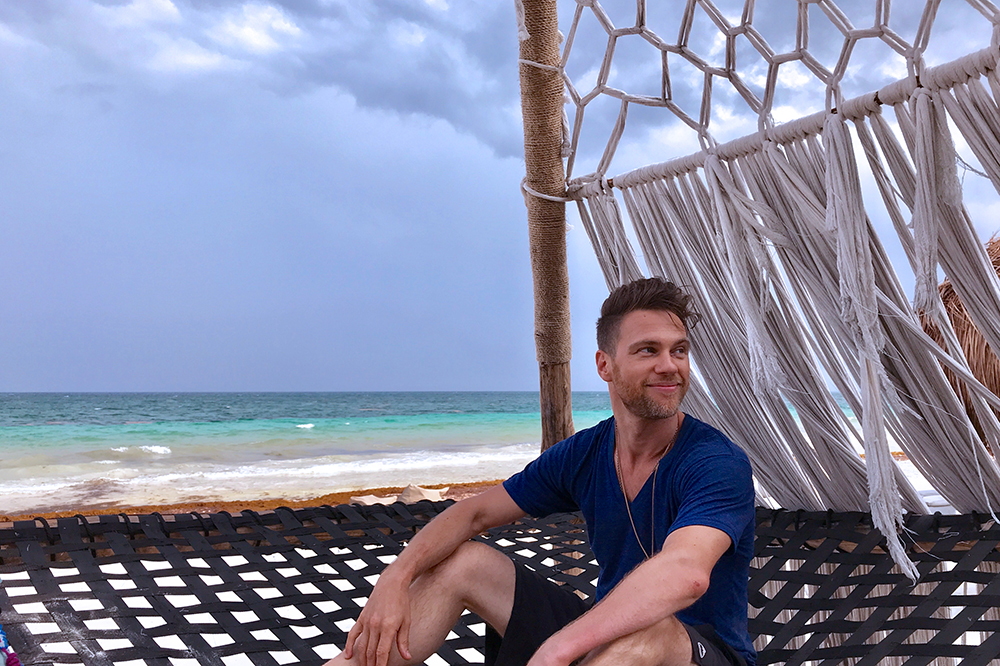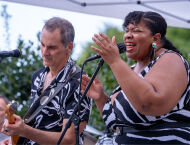Life
 Yonah Levy. Photo courtesy of subject.
Yonah Levy. Photo courtesy of subject.
Meditation Teacher Yonah Levy on Movement, Food + Mindfulness in D.C.
March 3, 2021 @ 5:04pm
Yonah Levy has been teaching meditation for 17 years, helping many of his students experience the relief that meditation and mindfulness can bring. Levy talked to us about how movement, food and mindfulness work together for a holistic approach to self-care. Note: This interview is a part of our 20 Masters of Mindfulness, Movement + Connection roundup, which ran in our Winter 2021 issue.
Tell me about your journey and how it brought you to your current role.
In college, I studied behavioral and social psychology, and then underwent five years of humanistic counseling training from a psychologist formerly taught by Abraham Maslow and Carl Rogers. Since then, I have worked with thousands of clients from all walks of life, helping them move beyond inner blockages and optimize their lives. I have been practicing and teaching mindfulness and meditation for over two decades.
In my late 20s, I was working in a role that triggered a stress response in me that I’d never experienced before. I often had a hard time sleeping, sometimes not sleeping much at all through the night, which made everything worse. This led me to study and practice meditation with disciples of Sri Chinmoy for one year. I also spent several years learning from Dr. Tara Brach and others through continuous self-study. I also went on to complete multiple Vipassana meditation courses under S.N. Goenka, based on teachings of Buddha rooted in 25 centuries of tradition.
Today, I lead by drawing from thousands of hours of meditation study, practice and facilitation. I blend Western science and psychology with Eastern, indigenous and intuitive practices. I have a positive and holistic approach, as I work with the fundamentals of the person as a whole.
How are you practicing and prioritizing self-care, especially mid-pandemic?
These are intense times. I have an array of tools I use to find peace and grounding. Starting my mornings with meditation is powerful and sets a positive tone for the day. I become conscious of awareness that is bigger than the movement of thoughts. Meditation allows me to feel bigger than my mind, and more peaceful than when I let my mind run the show. Meditation often calms my thinking and leaves me feeling more at ease, spacious and equanimous after sitting.
I feel most grounded and happy when I move daily. There’s a lot of intense energy that I can pick up, and moving in some way helps me keep it flowing so it doesn’t get stuck in my mind or body. I like to work out at the gym, walk briskly for 30 minutes when it’s brightest outside, or even jump around or dance in my home. Then there’s eating for vitality. I’ve learned a lot about food and how it ties to wellness. I do my best to prepare and cook most of my food from scratch, incorporating lots of colorful organic vegetables and fruits. One thing I’ve found is when I exercise, I crave healthier foods that make me feel better.
Human connection has been key for me, even if it’s just over the phone. When I can see people in person, that is even better. Making a point to connect with people in some meaningful way has a noticeable effect on my mood, and tends to leave me feeling more optimistic. Then, there’s going into natural spaces. Living in Northwest D.C., I’m spoiled with parks and trails, all of which usually put me in a better emotional state and headspace when I visit them. I will often physically write what I’m grateful for or what I am happy about. I usually pick up speed as I write, and feel my mood improve the longer I write. Sometimes, I do this by speaking out loud what I’m grateful for and happy about, too.
What does self-compassion mean to you, and how do you incorporate it into your practice?
I can be very hard on myself at times. When I become aware of my inner critic, I sometimes take some deep breaths and use mindfulness to see the automatic negative thoughts from a larger perspective. My inner critic can tell me that I’m falling short and I’m some version of not good enough. When I notice that I’m believing those automatic thoughts, it helps me to become mindful and compassionately realize [that] just because thoughts are present, doesn’t make them true.
Exercise is very helpful to shift my mental and emotional state when the inner critic is strong. Using mindfulness, I love to feel the movement of my body and engagement of my muscles as I exercise. I’m almost always in a better state afterwards. Then there’s the simple act of going outside, even when the weather isn’t ideal. The light, the breeze and the changing sky all have their ways of shifting me and letting me know beyond my mind, things are okay. Being outside usually helps a lot. Somehow, being under the vast sky helps me know there is greater love looking after me and the rest of life here on Earth.
Learn more at www.yonahlevy.com, www.fb.com/yonah.levy, www.insighttimer.com/yonah and yonah-levy.medium.com. Follow @yonahlevy on Instagram.
Enjoy this piece? Consider becoming a member for access to our premium digital content. Support local journalism and start your membership today.







